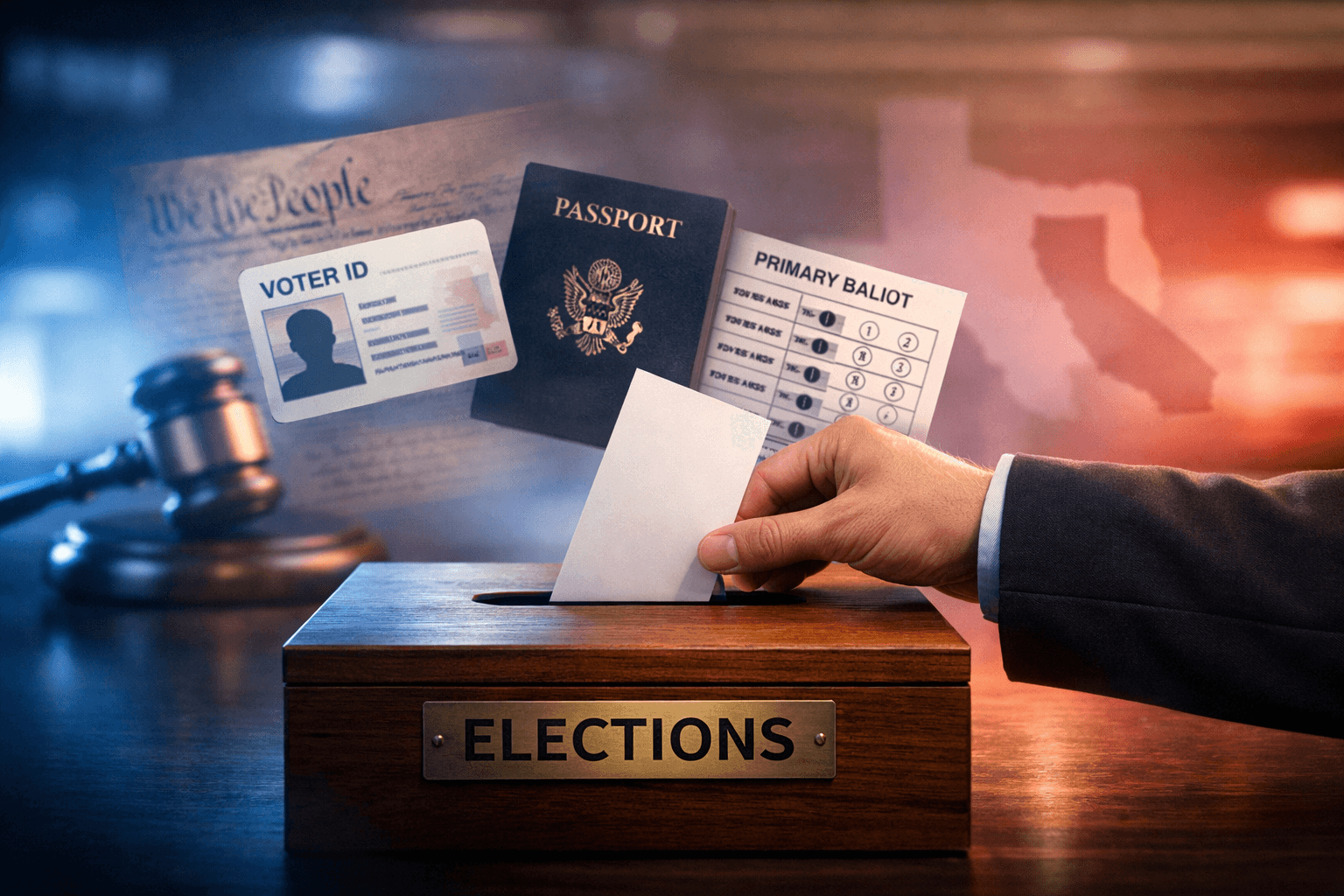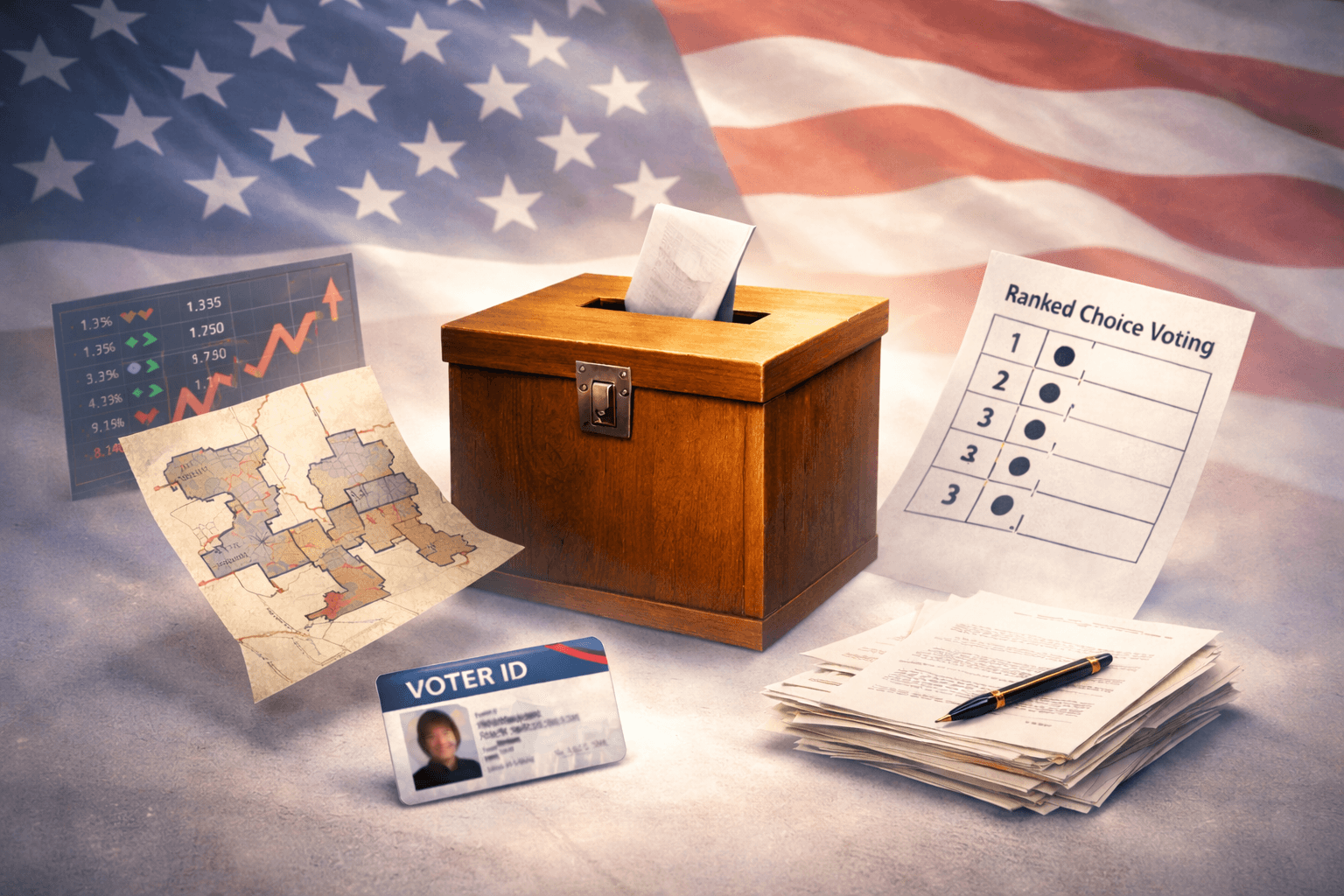POLL: San Diego Voters Dissatisfied with Government, Want More Choices

Photo Credit: Alejandro Luengo on Unsplash
The late Peter Ackerman, an expert in nonviolent civil resistance and a driving force behind reform efforts like Maine’s “More Voice” initiatives, said that even the best ideas are accepted in stages:
The first stage is, “That is the worst idea I have ever heard.” The next stage is somewhat more neutral, “Oh, I’ve heard of that.” Finally, if it’s a really good idea, he would say, “It transforms into something that was always their idea to begin with, and that they had the same idea all along.”
Today, there are rumblings about reform in California that have their roots in a decade-long journey that started on the West Coast, found fellow travelers in Maine, and is now finding its way back to California after stops in Alaska, Nevada, and Colorado.
Nonpartisan reform activists are testing the waters in some San Diego County cities, including Carlsbad, Vista, Chula Vista and San Diego.
Groups affiliated with the National Association of Nonpartisan Reformers have released polling conducted in both Chula Vista and San Diego showing 2 out of 3 voters would support a Charter Amendment to allow five, instead of two, candidates to advance to the general election and provide voters with the option of ranking those candidates in the general election.
Half of the voters supporting the Charter Amendment say it is because they want to have more choices at the ballot box in the general election. But, surprising even to the More Choice coalition members was that 57% of voters in the City of San Diego poll identified “corruption” as their number one reason for supporting a “More Choice” Initiative.
When voters were asked how often, if ever, they feel forced to choose between candidates that are “the lesser of two evils,” just 4.3 percent of San Diegans said “never.”
Election reform has come a long way in the past decade. The Independent Voter Project, which commissioned the San Diego poll, is most well-known for authoring California’s “top-two” nonpartisan primary passed by the voters in 2010.
The group also authored a successful San Diego initiative in 2016, Measure K, that prevented candidates from winning elections in low-turnout primaries where special interests and political parties excel at manipulating outcomes before most people vote.
Former IVP Chair Steve Peace, who wrote the California Constitutional Amendment abolishing partisan primaries, publicly called for “Reforming the Reform” in March.
“Election reforms that combine the best of open primaries and candidate ranking systems are generating broad support. The people who worked for these systems for many years have joined forces to improve the proposals and work together to get them passed. This is why we’re seeing more mainstream nonpartisan electoral reforms popping up across the country,” said Peace.
“We understand that no system is perfect and taking the next step in California by embracing ‘More Choice’ plans that combine the best elements of open primaries with the right of general election voters to rank multiple candidates is the next step in protecting and expanding voter rights.”
He’s right. Since Maine adopted its statewide ranked choice voting system in 2016, voters in Alaska and Nevada have approved ranking systems that also incorporate nonpartisan primaries. Now, Idaho, Colorado and Montana reformers are poised to have similar election reforms on their ballots this November.
IVP Chairman Dan Howle acknowledged this evolution of thought.
“We’ve embraced the More Choice Initiative because we’ve been able to sit down with advocates from the ranked choice voting world, we’ve learned from them, and we’ve found ways to reduce the negative aspects and incorporate the positive aspects of open primaries and ranked choice voting into a single system that can make our elections a lot better,” he said.
I had the honor of working with Peter Ackerman when the Chamberlain Project began leading a citizen’s initiative in 2014 to make ranked choice voting the law in Maine. We had long been looking for ways to disrupt the dominance of the hyper-partisan political system, from Americans Elect, to Level the Playing Field, to supporting Angus King’s first independent run for U.S. Senate in 2012.
But neither trying to get independent ballot access for president, trying to get a third voice on the presidential debate stage, nor actually electing an independent to the US Senate got to the core of voter frustrations.
Voters were incredibly frustrated that if they supported any candidate that was not nominated by either major party, they would be “wasting their vote” by picking a spoiler.
Just ask Google, “ways to get around the spoiler issue,” and you will discover ranked choice voting. That is what led us to explore ways to give voters more meaningful choices.
But when we first posed the question, “Are You Ready for Ranked Choice Voting?” to several thousand Mainers in November 2014, the universal response was, “What?” No one knew what we were even saying.
But when we simply said that we were collecting signatures to allow more choices and more voices in politics, to fight against extreme partisanship, to give marginalized candidates in Maine the fair chance to compete, more than 67,000 Mainers signed our petition to change the state's election system.
Senator Dick Woodbury, who as an independent candidate won two terms in the Maine state Senate, introduced a bill in the Maine legislature to bring more choice to Maine – but it failed. So, we met at The Crooked Mile Cafe on Milk Street in Portland, and together decided to launch the nonpartisan Committee for Ranked Choice Voting.
In Maine, as in 24 other states, we are blessed with the right to initiate laws as citizens. Using the Maine Constitution as a guide, we began the process, with a huge lift and list from former Portland Rep. Diane Russell and many others.
We then got in touch with IVC Media’s Anthony Astolfi and Chad Peace, who had helped IVP succeed in California, teamed with veteran media strategists Will Robinson and Tierney Hunt, and recruited a team of lawyers from Drummond Woodsum and Bernstein Shur.
Kyle Bailey, a local strategist, stepped up to manage the campaign, determined to remain nonpartisan and relentlessly positive. Pollster Lisa Grove came up with the slogan, “More Voice.”
Our long-shot initiative was passed by Maine voters in 2016. Ranked Choice Voting became the law of the land on January 7, 2017. We were jubilant. Finally, a system that would allow people to vote for the person they liked the most without fear of electing the person they liked the least.
But just four days after ranked choice voting became law, we realized that laws passed by citizens can just as easily be repealed by politicians in the state legislature. It had never occurred to us that this would happen, but on October 17, 2017, in a special late-night session, the legislature killed our citizen law.
Luckily, in Maine we also have something called a People’s Veto, allowing citizens to reverse an action of the legislature. From the Senate gallery on the night of the repeal, we sent out a press release announcing our intentions to try again.
Over the next 88 days, and through a series of brutal winter storms, 1,800 volunteers collected 80,000 more signatures to save ranked choice voting in Maine. We got the second referendum on the ballot on June 12, 2018, and this time it passed by an even wider margin.
We won a series of lawsuits at both the state and federal level thanks to Attorneys Kate Knox, James Monteleone, and Mike Bosse at Bernstein Shur and Maine became the first state in the country to use ranked choice voting to elect candidates for the US Senate and House. The first two elections in 2018 went off without a hitch, even though Maine’s secretary of state predicted that there would be “cars burning in the streets,” if he were forced to implement the law.
In 2019, we worked to expand ranked choice voting to include presidential elections in Maine. The powerful State Senate President Troy Jackson was now squarely on the side of the people, and Governor Janet Mills allowed Senator Jackson’s bill to become law without her signature.
In November 2020, Maine voters became the first in the nation to rank our choices for president.
That same day, Alaska voters passed a nonpartisan primary initiative that – you guessed it – allowed voters to rank 4 candidates in the general election. Their citizen initiative was even more innovative than the one we had worked so hard for in Maine.
Scott Kendall had been inspired not only by Maine’s success but also by Katherine Gehl, the author of The Politics Industry: How Political Innovation Can Break Partisan Gridlock and Save Our Democracy and co-Chair of the National Association of Nonpartisan Reformers, who posited that ranked choice voting was not enough on its own. It needed to be combined with open, nonpartisan primaries.
In 2020, Alaskans voted to open their primary elections to all voters regardless of party, and then to send the top 4 to the general election ballot where voters could rank all, or some, of the candidates.
In 2022, Nevada voters took it a step further, voting to open their primaries to all voters and to send the top 5 vote-getters to the general elections. In November, under Nevada law, voters will be asked a second time if they support Gehl’s “Final Five” Voting reform. If they say “yes” again, voters in the Silver State too will have more choices.
With states like Idaho, Colorado, Montana, and South Dakota poised to offer their voters more choice this November, maybe it’s not so surprising that voters in large cities like San Diego -- as well as suburban cities like Chula Vista -- also want More Choice.
“This is what people want, they want more choices, they want more options, and this is how you give it to them,” said Peace.
Watching the reform we fought so hard for in Maine spread to Alaska and Nevada and back to California again is incredibly gratifying. The improvements and interactions we see today hold the promise of finally getting America out of the nasty partisan-driven political rhetoric that has gridlocked our country.
"I am so excited for the future. Our laboratories of democracy will prove these ideas right - or prove what needs to change to make them right. And we will create the system changes needed to help our government achieve the results that we Americans deserve," said Gehl.
The polling in San Diego shows that people are not as divided as our broken political climate suggests. Two-thirds of the electorate supporting a citizen’s initiative at this early stage is a big deal. We’ve come a long way. Our persistence, our positivity, and even our patience is paying off.
These are encouraging signs for More Choice in San Diego. Even more intriguing for the nationwide reform movement is the prospect that what is brewing in San Diego is likely to go statewide soon. California here we come!
More About the Poll
The San Diego poll was conducted by Competitive Edge Research on behalf of the Independent Voter Project and surveyed likely voters in San Diego from May 6-15, 2024. The poll has a confidence interval of ±4.8%. Voters were polled on issues and campaigns expected to be of high profile in the County of San Diego for purposes of demographic identification of likely supporters of the More Choice Initiative.
The Chula Vista poll was conducted by Competitive Edge Research on behalf of San Diegans for More Choice Voting and surveyed likely voters in the City of Chula Vista from March 29 – April 4, 2024. The poll has a confidence interval of ±4.9%.
 Cara Brown McCormick
Cara Brown McCormick







